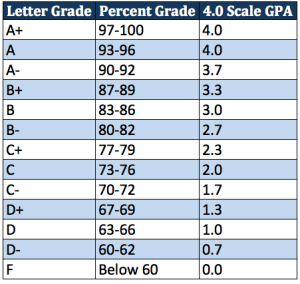Assuming you’re an upperclassmen planning ahead for grad school, you’ve already done a lot of college activities leading up to now. Let’s flesh out everything you’ve most likely completed so far because this will serve a point later:
- Diligently planned your class schedule each semester
- Studied early mornings and long nights to improve your GPA
- Visited office hours numerous times to better understand the material
- Sought out interesting and demanding internships
- Developed leadership skills by leading a student organization
- Spent hundreds of hours preparing for your grad school admissions test and took the test
Now, there’s only one thing in the way of getting accepted into grad school: your grad school application.
The reason I showed you how far you’ve come is because you probably didn’t know exactly what you were doing in each of those actions above, but you eventually got through them. And the same is true in your grad school application.
You might suffer from trying to make your application perfect, but you need to get out of that mindset because it only holds you back. Instead look at this application process as only one more task, and the last task, until the dust settles and you can relax.
By taking action to complete the grad school application tips I laid out below, you’re bound to complete an excellent application that impresses the admissions committee. Next stop, hearing you’ve been accepted, and then celebrating.
15 Grad School Application Tips
1. Be absolutely sure why you want to attend grad school
I wish I didn’t have to write this, but too many peers I know went to grad school because they couldn’t find anything better to do. That’s enough foolish reasoning in itself. So when you add the years of your life and tuition spent on a career you’re not exactly interested in, it’s like lighting part of your life and your money on fire.
Before you apply and commit to grad school, do yourself a favor and reflect on these questions:
- How interested are you in the subject material and learning environment?
- Do you truly need this graduate school program to reach your career goals or are there other routes?
- Are you going to be happy in this program and field?
- Are going to grad school for yourself, and not for anyone else (like your parents)?
- Does it make sense to go to grad school next year, or is it smarter to take time off gaining work experience and money?
If you get tripped up by a question, then carefully take a step back to reconsider if grad school is the best option for you. Potentially it’s not and that’s ok, because it’s better to know now than when you’re too far down the road and it’s too late. I set my mind on law school through my freshman to junior year, and then senior year I reflected on my personal and professional goals, and decided I didn’t want to be a lawyer after all.
But if all systems are still a green light after considering those questions, then continue on applying with confidence.
2. Craft a list of grad schools and programs where you’re going to apply
Choosing where you want to apply may seem easy at first, but it can get difficult. When you consider where you see yourself getting accepted, where you want to work after graduation (as many grad schools place people in their immediate region), and total cost of attendance, the waters get muddy.
To create a list, you can do a simple internet search while using your test score and GPA to get a good idea of where you will get accepted. Write down what schools stand out, and make a note of some reach and safety schools. This way you cast your net wide and mix in applications to some safety schools, target schools, and reach schools.
Finding a grad school that places alumni in a location you prefer is extremely important. If all your friends and family are on the west coast and you love it there, then it’s probably not wise to apply to all east coast schools. Because once you graduate, it’s likely you’ll get a job on the east coast.
For example, although the University of North Carolina might be your dream school at this point, if you hate the south and living in North Carolina, then it’s not the best grad school for you.
Lastly, keep in mind tuition and cost of living when creating your list. You won’t have a specific comparison of cost until scholarship and financial aid notices are received, but an internet search will give you a baseline figure.
3. Start your applications early
I’m sure you already know this (but in case you don’t), applying to grad school takes a good amount of time and effort. When anything involves considerable time and effort to complete, it’s always wise to plan ahead.
Because if you try to get this done last-minute, you’re more likely to be stressed and make mistakes. A rushed job could cause you to forget to ask for recommendation letters or entirely miss the application deadline.
Or if you procrastinate to the last day and then a technical problem occurs, you have no grace period to call the admissions office and get it straightened out.
And of course these mistakes will get you rejected and you don’t want that. You’ve worked too hard to jeopardize your future because you started applying to grad school too late.
When you start this process early, the quality of your work and your mental health is elevated.
4. Create a schedule for application deadlines, scholarship deadlines, and financial aid deadlines
Before you eventually get lost in trying to make your resume or personal statement perfect, you should first make a list of all the important deadlines.
If you use a calendar, add the application, scholarship, and financial aid deadlines. If you don’t own a calendar, create a document and type in these dates by order of soonest to latest. Then print this out and stick it to somewhere in your room that will remind you each day.
Knowing what application deadlines are due for each school can make it clear of where to apply to first and where you can wait to do a little later.
Although, I recommend applying as early as possible for each school because that seems to be your greatest chance of getting accepted. And it’s before all the money is depleted for scholarships and financial aid.
Filling out the FAFSA, scholarship, and grant applications aren’t fun, but for those who will get money because of it, the time is more than worth it.
5. Connect with current or former graduate students to gain insight
To help you with both the admissions process and to potentially narrow down your list, it’s a great idea to connect with those who already walked in your shoes. Call up current or former graduate students that you know and ask for their advice on any questions you may have.
Reaching out to professors could be helpful too, because it’s likely they know about the process or know someone who will be knowledgeable about it.
And if you’re undergrad is like mine, current grad students (or school representatives) will visit your campus in a booth at an event to share more about the program and what it offers. I’ve found these events helpful because you can ask good questions and get unique insight that isn’t available online.
6. Pay the application fee, upload test scores, and undergrad transcripts
This grad school application tip is obvious, but it’s necessary because often it’s the little things that students miss because their mind is focused on other tasks.
Since test score results can be a waiting game too, especially if you did a retake, I recommend uploading those to your application as soon as they’re available and fresh in your mind.
Also, sometimes it can take around 30 days to get your undergraduate transcripts released, so don’t fall behind the ball on this task.
Given you complete these steps early, it gives you positive momentum before the more challenging aspects of the application process.
7. Use your resume to tell your story
The personal statement is a great way to show who you are and let your personality shine through on your application. But, don’t underrate your ability to tell your story through your resume, too.
A resume that reads like a fact sheet is boring and unimpressive. But, a resume where each line points to a common overarching theme about you is where you can stand out from all the other resumes.
To tell this story, make every word on your resume count, quantify your results (example: Sold 135% above my annual quota) because numbers support your value, and customize your resume to better fit the grad school.
While the 10 resume mistakes I laid out in this post are referring to job applications and not grad school, many of these mistakes and resume solutions will give you insight to improve your grad school resume.
8. Ask professors or professionals for an excellent recommendation letter
A little unknown secret to most applicants is that they have considerable influence over the quality of their recommendation letter. That’s right, your fate doesn’t rest in the hands of a professor who could potentially have a bad day and give you an average to below average reference.
Your preparation and communication will determine how excellent your recommendation letter turns out, and this is good news because you can control those two elements.
To be prepared, start thinking of possible references as soon as possible. What classes did you do well in? What professors know you best from your major? Who have you had multiple classes with?
Do the same with your work references, except I’ve found that professors might hold more value to the admissions committee. Anyway, these kinds of questions should bring you a list of options.
If you’re currently in their class or working for them, bust your butt to go above and beyond expectations, knowing that you’ll make it easy for them to write you a great letter.
When communicating your request for a rec letter, it’s key that you’re very clear with them on what you want. Specifically ask if they feel comfortable writing you a detailed, excellent recommendation letter. Stress how important specific letters are in the eyes of the admissions committee.
(If they seem hesitant about it, then say you appreciate their consideration, but you’re going to ask some other people instead.)
Then say you’ll make their job easy by providing your previous work, resume, transcripts, and whatever else they need.
The works because the odds are high that the people you’re asking are extremely busy, so you improve your chances by expressing how easy you will make the process for them. They also know you’re serious and appreciate their time, which will earn you big bonus points because most students don’t go the extra mile.
Lastly, don’t forget to mention their deadline and how they should turn it in. As I said before, they’re probably extremely busy, so this extra work could slip their mind if they aren’t aware.
Now that you have the general idea, this blog post has all the specific details and word-for-word scripts you can use when asking for a recommendation:
The Ultimate Guide For Requesting A Letter Of Recommendation For Grad School
9. Write and rewrite your personal statement
Your best shot to be seen as an interesting and unique candidate by an admissions committee is through your personal statement. (If you do interview, then this document becomes second but still holds heavy weight.)
Your hard factors like test score, GPA, undergraduate school, and program show one side of you. But they don’t show your personality and ability to work well with others. And the issue is the committee won’t know how amazing you are if you write a boring personal statement that reads like a fact sheet.
So start brainstorming ideas that truly allows the committee to get to know you on a deeper level. Assuming your topic is up to you, here are some questions that could lead you to finding what to write about:
- What is the most unique, unusual, or impressive trait about you?
- What are you interested in and passionate about?
- What do you hope to gain from this particular school/program?
- Are there any specific professors that you would be honored to learn from?
Be careful to not fall into the trap of writing a personal statement that you think the admissions committee wants to hear. Your traumatic childhood experience, ambitious goals, or achievements don’t ring well when they’ve seen the same thing repeatedly over the years. Get creative, honest, and show who you are without telling.
Once you have an idea, start writing for 15 minutes with no expectations. Just see what comes of it. If it’s trash, throw it away. If it’s good, build on it. No one created a masterpiece on their first draft.
Once you finish your first draft, have a trusted professor, or multiple professors, review it and give you their critiques (maybe the same one you asked for a recommendation letter). I do want to warn you, it can be difficult when working with multiple professors who have competing ideas about what to do and pull you in different directions. Working with one professor can be more productive for this reason.
After other people review your personal statement, it’s time to go back to the drawing board and revise your document. I know many students who entirely ditched their initial work to start from scratch for a different course, so don’t be alarmed if this happens to you.
You’re not done yet. Realistically and to do it right, a quality personal statement is going to result after multiple drafts and revisions. This process is a main reason why it’s necessary to get started as soon as possible on your grad school applications.
10. Triple check your entire application for accuracy
If you don’t get accepted because other applicants had better numbers than you, you can deal with it. But if you get rejected because you made a dumb error on your application, that’s going to make you furious.
When you’re this close to the finish line, it’s time to be diligent. Here’s a review of everything to check for completion. Did you:
Pay the application fee?
Meet the application deadline, as well as the scholarship and financial aid deadline?
Upload your undergraduate transcript?
Attach your most current resume in the correct format?
Confirm all your references submitted their recommendation letter?
Check to confirm your standardized test scores are already, or will be, sent to the schools where you applied?
Remember to meet the minimum and maximum word count for your personal statement, and submit it?
When you’re absolutely positive everything is accurate and you’ve addressed everything ask of you, follow the specific directions and hit submit. One last tip is to remember that each grad school isn’t the same, so their applications may be different. Take it slow, and you’ll be fine.
Once you’ve submitted your application, the following five grad school application tips will help you remain calm and busy during the waiting game.
11. Remain patient
The waiting period can seem like the hardest part of this entire process, which is ironic because it requires no actions. But don’t forget that these decisions take months at the earliest.
Admissions committees have to review each applicant and then compare them among each other. This usually involves multiple professors and committee reviews before group discussions and a final decision that sorts applicants into an accepted, waitlist, and rejected pile. Then they have to crunch the numbers and determine how many students they’re admitting this particular year and a host of other factors I won’t bore you with.
However, after you submit the application, essentially everything is out of your control. That’s why it doesn’t make sense to spend months in an anxious mood, getting angry every day you check your email and don’t hear anything.
Instead of engaging in this negative approach, you can direct your energy in much healthier avenues, which I’ll cover in the following steps.
Learning the ability to control what you can control, improve each day, and be patient is the making of success.
12. Prepare for potential interviews by practicing
If you’re fed up with waiting and feel like you need to do something that could potentially improve your admission chances, you can practice good interview skills. Many grad schools require, or offer, interviews, so it’s in your best interest to not underestimate the weight of the interview process.
Because many admissions committees use interviews as the deciding factor on whether students with borderline numbers get accepted, put on the waiting list, or rejected. Or when they’re torn on who to accept and reject between a small group of students with a few spots left, they will choose who interviews better.
But, the funny thing is it’s not uncommon for applicants to spend hundreds of hours on studying for a good undergrad GPA, prepping for the admissions test, and filling out applications, while they choose to give zero time to practice interviewing. Don’t let that be you.
If you’re in a scenario where interviews are voluntary, my philosophy is to sign up. Prepare extensively. And then knock the interview out of the park to get your acceptance letter. This assertive move and execution will show positively, while those less confident in their interview ability will pass on the opportunity and usually land on the waiting list.
13. Get busy with friends or activities you enjoy
Another option is to mentally ditch the grad school process entirely and do something you enjoy. Take advantage of this free time to get back into, or start, the activities you had less time for during this busy season.
Go to happy hour with your friends, spend a night just hanging out watching Netflix without any responsibility, or take a mini-road trip. These will help your mental health and offset any stress.
Or you can use this time to better yourself by working out and eating healthier to improve your physical health, which also protects your body from stressing too much.
Whatever you do to stay busy, experiencing breathing room outside of the grad school admissions process will be healthy and help you move forward when you hear if you’re accepted or rejected. Speaking of rejection?
14. Be ready for rejections
There’s a very realistic chance that some program is going to reject you (or maybe they all will, I don’t know). Be ready for it and recognize it doesn’t mean the end of the world or your life is ruined. Getting rejected can be counterintuitive as it turns into a good thing for your future.
Because there’s no doubt in my mind that success and failure are linked together. No one is pitching a perfect game in life, and the best at what they do have failed the most.
So use this rejection to gain perspective and improve. Maybe you need to apply to a wider range of grad schools. Maybe it’s best to take a year off and gain work experience or study more to improve your admissions test score. These are some examples of many different insights that you wouldn’t have gained before getting denied.
My philosophy is you can’t fail when you look at failure through a positive mindset.
15. Focus on your true goal
As much as the whole grad school process can consume you, it’s refreshing to mentally take a step back and refocus on what matters most.
Unless you’re a nutjob, your true goal isn’t to get accepted to a certain grad school. Your true goal is to become a doctor, dentist, lawyer, speech pathologist, professor, etc. In times of stress during this process, look past grad school and focus on the career you love doing.
Although I admit some grad schools give you a better chance to get your dream job than others, regardless it’s still important you don’t mistake your true goal (your future career) with a stepping stone goal (a certain grad school).
After reading more than 3,400 words, that’s it! If I was you, I would bookmark this blog post for later or print it out to use it as a checklist during the application process.
Related: How To Fund Graduated School
Are there any grad school application tips that you think I missed? What are you most excited about for grad school? And on the flip side, what about grad school makes you nervous?




Very complete and helpful. Wish I would have had this while going through my process prior to entering medical school. Especially on my mind is the process of getting a letter of recommendation- as I am asked often. I usually like to have had some small project I worked with them on.
Good point about how a small project can be a great story for the recommender to use in their reference. These projects usually show the kind of work an applicant can do and their personality under pressure.
Can you please provide more information on ho w students can build excellent writing skills(as it it the heart of the sops/lors ,written ability tests). I know practice is the answer but I just seem to have a lot of problem forming really powerful,succint,rich sentences.I face a lot of problem describing my thoughts. What can a student do every day to improve?